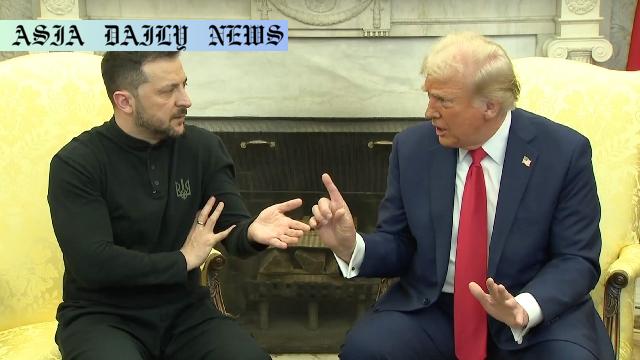Ceasefire: Trump and Zelenskyy fail to reach an agreement on Ukraine’s mineral resources, escalating tensions after heated discussions.
US President Trump and Ukraine’s Zelenskyy had a heated argument in Washington over security and a ceasefire.
The planned minerals agreement was not signed, and their joint press conference was canceled.
The meeting ended in deeper disagreement, likely affecting future ceasefire negotiations.

Overview of the Failed Ceasefire Talks
The highly anticipated meeting between US President Donald Trump and Ukrainian President Volodymyr Zelenskyy, held at the White House, ended without achieving its primary goal. The two leaders were expected to finalize a mineral resource agreement, which would have strengthened US-Ukraine relations and supported Ukraine’s economy. However, the talks quickly devolved into a tense exchange, primarily centered around differing approaches to resolving the ongoing conflict with Russia and achieving a ceasefire in Ukraine.
Key Points of Contention
The disagreement stemmed from a fundamental divide in strategies to address the ongoing war in Eastern Ukraine. Trump criticized Zelenskyy for his stance on a ceasefire, stating, “You’re gambling with the lives of millions of people, you’re gambling with World War Three.” Zelenskyy firmly rebutted, emphasizing that a ceasefire alone would be inadequate without concrete security guarantees. This ideological chasm highlights the precariousness of achieving cohesion between the two nations on such a critical issue.
Impact on US-Ukraine Relations
Instead of fostering closer ties, the meeting seems to have further strained an already complicated relationship. Both leaders left the meeting without issuing a joint press statement, and the planned news conference was abruptly canceled. The failure to sign the mineral resources agreement underscores this lack of alignment, which could have significant repercussions for Ukraine’s economy as well as its international alliances. In the aftermath, Zelenskyy departed the US for Britain, where he will focus on garnering European support during a defense meeting in London.
Implications for Future Negotiations
The discord from the Washington talks will undoubtedly cast a shadow over future ceasefire negotiations. Strong relations with the US are critical to Ukraine’s survival as it continues to fend off Russian aggression. Without consensus on a shared path forward, both countries find themselves at an impasse, complicating broader efforts to secure peace in Eastern Europe. The lack of progress may leave Ukraine increasingly reliant on European allies to fill geopolitical and economic gaps.
A Long Road Ahead
Despite the breakdown in discussions, the need for continued diplomacy remains paramount. Both leaders face immense pressure domestically and internationally to find viable solutions to the ongoing crisis. For Ukraine, security guarantees and unwavering support are existential needs. For the US, balancing global responsibilities and maintaining credibility on the international stage will remain central concerns. The outcome of future negotiations, including those involving European allies, will likely determine the trajectory of this alliance.
Commentary
The Complexity of Ceasefire Negotiations
The breakdown in talks between President Trump and President Zelenskyy highlights the multifaceted challenges of negotiating a ceasefire in a protracted and geopolitically sensitive conflict. Both leaders approached the issue with diverging priorities. Trump’s rhetoric emphasizes risk aversion, while Zelenskyy seeks robust security commitments to ensure sustainable peace in his war-torn nation. This impasse demonstrates how delicate these high-stakes negotiations can be, especially when external powers and global dynamics are involved.
The Stakes for Ukraine and Its Allies
For Ukraine, the stakes couldn’t be higher. Zelenskyy’s rejection of a mere ceasefire reflects a deep understanding that peace without security measures could quickly unravel, plunging his country back into chaos. His steadfastness on this issue is commendable but adds layers of difficulty to international diplomatic efforts. Meanwhile, for the US, managing its position as a key ally while attempting to influence the broader geopolitical landscape of Eastern Europe requires careful maneuvering, something that was evidently lacking during these talks.
Opportunities for Diplomatic Reset
While Friday’s meeting ended on a sour note, it represents an opportunity for both nations to reevaluate their strategies. The absence of agreement underscores the need for stronger preparatory work ahead of such high-level talks. Both leaders should consider leveraging intermediaries or expanding their diplomatic teams to bridge gaps and align priorities more effectively. The inclusion of European allies, particularly during upcoming defense meetings in London, may provide new pathways to consensus-building.
A Hopeful Outlook Despite Setbacks
Despite the apparent failure, there remains hope for future progress. Both nations share a vested interest in countering Russian aggression and ensuring stability in the region. With heightened awareness of the challenges at hand, there is a possibility for more thoughtful and measured engagement in subsequent negotiations. The proactive involvement of international institutions and mediators could further facilitate this process, optimizing outcomes not just for the US and Ukraine, but for global peace initiatives as well.


